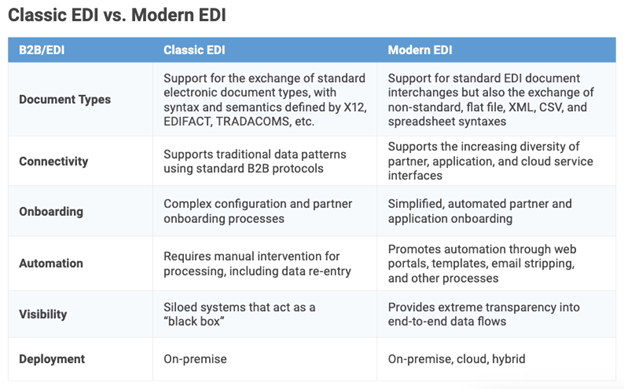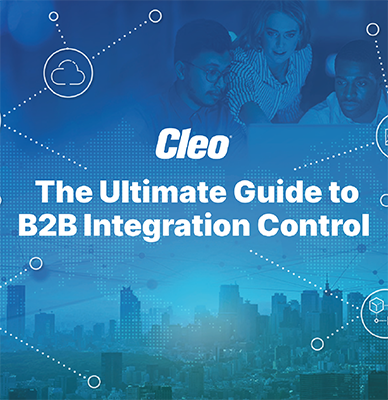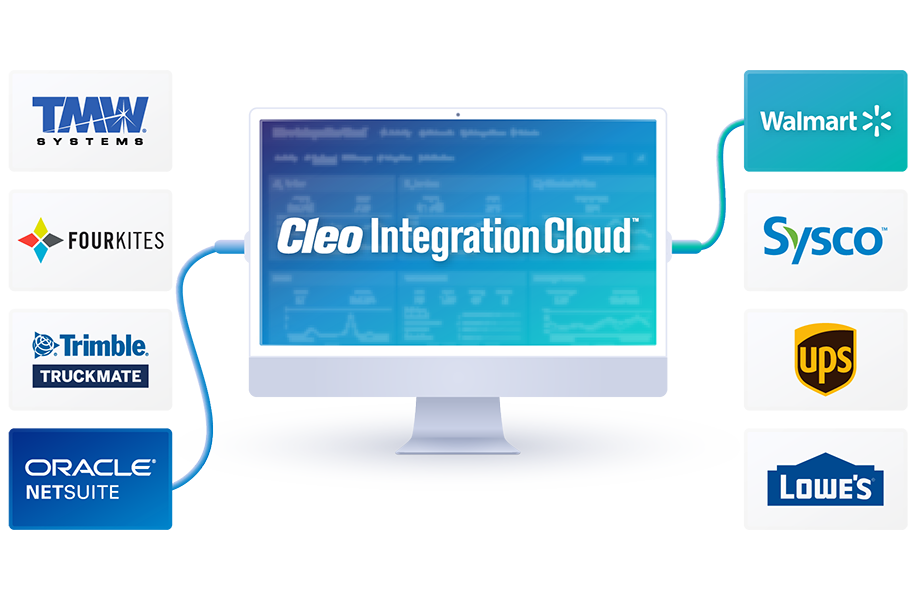Electronic Data Interchange (EDI) Wholesale Transactions Guide

In this article, we cover:
- What is EDI
- What are EDI transactions
- History of EDI in wholesale
- Advantages of using EDI in wholesale
- Business replenishment through modern EDI
- Frequently used wholesale EDI transactions
Wholesale companies wear many hats. Whether it's managing processes for order to cash, procure to pay, and load tender to invoice, or ensuring they've got the right amount of trucks within the company fleet, there are endless responsibilities. But those responsibilities don't have to be problems. With the right kind of modernized EDI software in place, wholesalers are able to thrive rather than struggle.
What is EDI?
EDI (Electronic Data Interchange) technology has been around for quite some time. It is the foundation that many businesses rely on in order to better serve their customers, trading partners, and other members of a digital ecosystem. Companies use EDI to exchange business documents digitally through a standardized format. EDI connects directly from one business to another through e-commerce platforms or ERP systems.

The most common type of digitally transmitted documents are purchase orders, invoices, and advanced shipping notices. EDI is so widely used because it provides reliable communications that all companies, no matter the industry, require.
What are EDI Transactions?
EDI transactions are standardized electronic business documents used by trading partners to send and receive business information, such as when one company wants to electronically send an EDI order to another organization.
These transactions were designed to be standardized and are independent of the communications used by companies or the software technology that sends and receives the EDI data.
Companies from wholesalers, distributors, manufacturers and trading partners exchange these documents using EDI standards to automate and streamline purchase orders, invoices, acknowledgments, payments, tracking, and other reports.
Any EDI transaction document must contain a certain minimum amount of vital data. Without these EDI compliance requirements, an EDI document becomes useless. Adhering to strict EDI feed formatting rules helps define precisely how and where each part of data on the document will be found and used. Each document is assigned one of the dozens of transaction numbers from the EDI public format.
History of EDI in Wholesale
Wholesalers need technology that allows them to onboard trading partners and applications quicker, as well as reduce TCO and resolve any potential issues instantly. When wholesalers are connecting with customers (B2B or even B2C) they must be able to send and receive invoices electronically, provide order and shipping confirmations, as well as manage all of their products in standard formats that are transparent.
As you can see, that is a lot for wholesalers to manage, simply to conduct everyday business. That's what makes EDI such a useful and powerful tool because it remains the de-facto standard for B2B companies. But savvy wholesalers are going one step further than that, and embracing a modern EDI integration platform because it helps them become that much more agile and responsive than they've ever been before.
Advantages to Using Modern EDI in Wholesale
Utilizing modern EDI systems allows wholesalers to optimize their digital value chain by turning innovative integration into a true competitive advantage. By instrumenting leaner and more efficient inventory purchasing, storage, and distribution built on integration control and actionable insight to manage and deliver value to customers across the supply chain.
Being able to design and build EDI and API-based integrations to all the members of a digital ecosystem on a single platform allows wholesalers to refine their supply chain and enable distribution channels and improve customer expectations through choice, control, and credibility.
EDI Replenishes Cost Efficiency and Data Accuracy
EDI offers companies an abundance of benefits. Two of these benefits include improving cost efficiency and increasing data accuracy.
Cost Efficiency
EDI improves cost efficiency for a multitude of reasons, including:
● Companies can implement automated, end-to-end integrations between ERPs and wholesalers
● SLAs (Service Level Agreements) are rarely missed because EDI software responds near-instantaneously to EDI transactions from retailers and other trading partners—resulting in fewer penalties and fees, happier customers, and more business opportunities
● Automation makes fewer mistakes than humans, which means processes and supply chains are less likely to be disrupted and bottlenecked
● Upfront costs of deploying EDI is quickly recouped because companies do not have to pay salaried employees to constantly manage the process
● Documents are processed faster since EDI works 24/7, meaning it does not require trainings, breaks, or nights and weekends off
● Employees have more time to focus on other tasks and projects since they do not have to focus solely on managing EDI transactions
Data Accuracy
EDI also improves data accuracy because it empowers wholesalers to integrate their entire digital ecosystems. This enables wholesalers to set up protocols that allow their ERP or WMS to automatically pull and update data from each of their integrated platforms in real-time, creating a single source of truth.
This improves data accuracy because it removes the need for humans to manually pull data. Humans can easily make an error when recording data by misreading a number, mistyping, entering the information in the wrong field, etc. Additionally, having a human search through countless platforms to find the necessary data makes the process more complex and susceptible to errors.
Furthermore, it can take days for a human to sift through the various platforms to find all the data they are looking for. This means by the time a human is ready to analyze the data they collected, most of it will be out-of-date forcing companies to assess expired data. Instead, automation refreshes data as it is updated, allowing companies to analyze the most accurate and up-to-date information so they can make informed and strategic decisions.
EDI Connects You to Your Essential Partners
EDI allows wholesalers to connect and communicate directly with their customers and trading partners across the globe, strengthening important ecosystem relationships. Greater connectivity allows for more business opportunities, greater transparency, more reliable distribution, and faster communication and transactions. Leading EDI providers support a wide range of connections and protocols, ensuring their customers can connect with almost any trading partner that wants to conduct business.
Moreso, wholesalers can harness EDI for connecting with trading partners and automating end-to-end EDI transactions—from the first purchase order to product delivery and invoicing. Another benefit of using EDI to connect with trading partners is that it provides a record of all the actions taken in a transaction. Therefore, if there is an issue with a transaction, wholesalers can access the record and determine what the issue is and when it occurred. So instead of companies having to look through their entire supply chain or going back and forth with a trading partner, they can quickly identify the root cause of the issue and fix it.
EDI Modernizes Your Supply Chain
Legacy EDI technology can greatly prevent wholesalers from reaching their full potential. Legacy EDI is slower, less intuitive, possesses fewer capabilities, restricts transparency, and more. On the other hand, modern EDI technology provides companies with numerous benefits and improvements, including:
● Extensive document and protocol support
● Greater connectivity and integration with trading partners, platforms, software, etc.
● Faster and simpler onboarding
● Automation capabilities
● Increased visibility into real-time data and supply chains
● Inventory management through custom targets and alerts
● The option of on-premise, cloud, or hybrid deployment

EDI Refines Your Business Strategy
The digital world moves quickly. Thus, businesses need to regularly adapt their business strategies to keep pace with the ever-changing digital landscape. Modern EDI solutions can help by bringing major advancements to businesses of all sizes and industries, including wholesalers.
With EDI, wholesalers can view real-time data across their entire organizations, removing burdensome data silos that often plague businesses. Companies can use this all-encompassing and accurate data to make informed, strategic business decisions.
There is also the aspect of swift communication speeds. EDI responds near-instantaneously to partner requests, so whether the wholesaler is receiving a purchase order or is sending a purchase order change, customers are notified immediately with updates regarding a transaction. Fast and excellent communication creates satisfied customers which can lead to more business opportunities for wholesalers.
Wholesalers can also better scale their businesses with modern EDI. Leading EDI solutions can accommodate wholesalers' evolving needs, allowing businesses to always be prepared for changing demand levels. This makes busy shopping periods like the winter holiday season a much smoother and less stressful time for all parties involved.
Lastly, environmental impact has been a trending topic in business for the past few years. With EDI, processes are digitized, allowing companies to go paperless. This is better for the environment and eliminates printing-related costs.
Frequently Used EDI Transactions for Wholesale
There are many recurring EDI transactions that are used by different industries; however, there are some transactions that wholesalers use on a regular basis. Those transactions include:
- Sent by a wholesaler to the customer in order to bill for goods ordered and services provided
EDI 830 - Planning Schedule/Material Release
- Sent by a wholesaler to communicate with suppliers. EDI 830 provides forecast data for upcoming orders that helps a supplier manage materials and labor to fulfill orders automatically based on the wholesaler's inventory levels
EDI 840 - Request for Quotation
- Sent by a wholesaler to request information regarding price, delivery schedule, and any other items from sellers of goods and/or services
- Sent by a wholesaler to purchase materials and/or services from a supplier. An EDI 850 is generally designed to provide information on the item, price, and quantities ordered, shipping details, payment terms, and discounts
EDI 855 - Purchase Order Acknowledgment
- Sent by a wholesaler to confirm the successful reception of an EDI 850. The EDI 855 communicates whether the EDI 850 was accepted or rejected, or what changes may have been made to accept the order by the supplier or seller
EDI 856 - Advanced Ship Notice
- Sent or received by wholesalers as a notice of an impending physical receipt of material or goods from a supplier. EDI 856 can also be sent by a wholesaler in response to an EDI 850, EDI 830, or EDI 862 transaction
EDI 860 - Purchase Order Change
- Sent or received by a wholesaler to request a change to a purchase order. The EDI 860 is also utilized by buyers to confirm their acceptance of changes to a purchase order made by the original seller
EDI 861 - Receiving Advice/Acceptance Certificate File Format
- Sent by a wholesaler to report the receipt of shipments or as a formal acceptance of returned defective items
EDI 940 - Warehouse Shipping Schedule
- Sent to instruct remote warehouses to authorize a shipment to a buyer, such as a retailer. The EDI 940 can also be used to confirm a shipment
EDI 943 - Warehouse Stock Transfer Shipment Advice
- Sent by a manufacturer to a remote warehouse as an advanced shipping notice of a transfer shipment that has been made from the manufacturer
EDI 944 - Warehouse Receipt Advice
- Sent by a wholesaler to acknowledge a receipt of a shipment at the warehouse. The EDI 944 is typically sent following an EDI 943
EDI 945 - Warehouse Shipping Advice
- Sent by a wholesaler to provide confirmation of a shipment. Wholesalers utilize EDI 945 to notify a trading partner that a shipment was made
EDI 997 - Functional Acknowledgment
- Sent in response to an EDI 850, an EDI 997 notifies the sender that the document has arrived and was processed by the recipient
So while yes, wholesalers do have all kinds of different business processes and daily tasks they must stay on top of in order to remain ahead of competitors, modernized EDI providers makes that process much more efficient.
Want to learn more?

About Cleo

Watch a Demo

Comprehensive Guide to Gaining B2B Control

Duraflame Case Study
